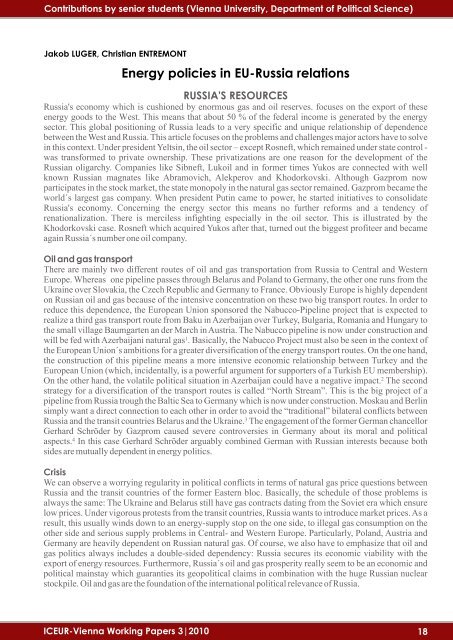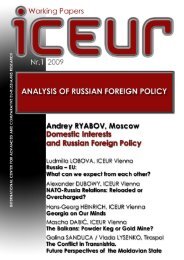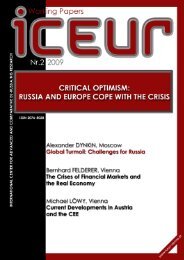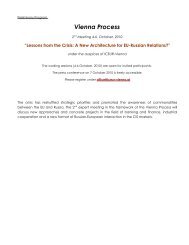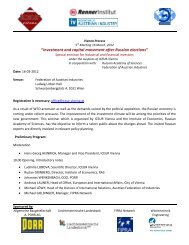EU-Russia: New Departures and Old Habits - ICEUR-Vienna
EU-Russia: New Departures and Old Habits - ICEUR-Vienna
EU-Russia: New Departures and Old Habits - ICEUR-Vienna
You also want an ePaper? Increase the reach of your titles
YUMPU automatically turns print PDFs into web optimized ePapers that Google loves.
Contributions by senior students (<strong>Vienna</strong> University, Department of Political Science)<br />
Jakob LUGER, Christian ENTREMONT<br />
Energy policies in <strong>EU</strong>-<strong>Russia</strong> relations<br />
RUSSIA'S RESOURCES<br />
<strong>Russia</strong>'s economy which is cushioned by enormous gas <strong>and</strong> oil reserves. focuses on the export of these<br />
energy goods to the West. This means that about 50 % of the federal income is generated by the energy<br />
sector. This global positioning of <strong>Russia</strong> leads to a very specific <strong>and</strong> unique relationship of dependence<br />
between the West <strong>and</strong> <strong>Russia</strong>. This article focuses on the problems <strong>and</strong> challenges major actors have to solve<br />
in this context. Under president Yeltsin, the oil sector – except Rosneft, which remained under state control -<br />
was transformed to private ownership. These privatizations are one reason for the development of the<br />
<strong>Russia</strong>n oligarchy. Companies like Sibneft, Lukoil <strong>and</strong> in former times Yukos are connected with well<br />
known <strong>Russia</strong>n magnates like Abramovich, Alekperov <strong>and</strong> Khodorkovski. Although Gazprom now<br />
participates in the stock market, the state monopoly in the natural gas sector remained. Gazprom became the<br />
world´s largest gas company. When president Putin came to power, he started initiatives to consolidate<br />
<strong>Russia</strong>'s economy. Concerning the energy sector this means no further reforms <strong>and</strong> a tendency of<br />
renationalization. There is merciless infighting especially in the oil sector. This is illustrated by the<br />
Khodorkovski case. Rosneft which acquired Yukos after that, turned out the biggest profiteer <strong>and</strong> became<br />
again <strong>Russia</strong>´s number one oil company.<br />
Oil <strong>and</strong> gas transport<br />
There are mainly two different routes of oil <strong>and</strong> gas transportation from <strong>Russia</strong> to Central <strong>and</strong> Western<br />
Europe. Whereas one pipeline passes through Belarus <strong>and</strong> Pol<strong>and</strong> to Germany, the other one runs from the<br />
Ukraine over Slovakia, the Czech Republic <strong>and</strong> Germany to France. Obviously Europe is highly dependent<br />
on <strong>Russia</strong>n oil <strong>and</strong> gas because of the intensive concentration on these two big transport routes. In order to<br />
reduce this dependence, the European Union sponsored the Nabucco-Pipeline project that is expected to<br />
realize a third gas transport route from Baku in Azerbaijan over Turkey, Bulgaria, Romania <strong>and</strong> Hungary to<br />
the small village Baumgarten an der March in Austria. The Nabucco pipeline is now under construction <strong>and</strong><br />
1<br />
will be fed with Azerbaijani natural gas . Basically, the Nabucco Project must also be seen in the context of<br />
the European Union´s ambitions for a greater diversification of the energy transport routes. On the one h<strong>and</strong>,<br />
the construction of this pipeline means a more intensive economic relationship between Turkey <strong>and</strong> the<br />
European Union (which, incidentally, is a powerful argument for supporters of a Turkish <strong>EU</strong> membership).<br />
2<br />
On the other h<strong>and</strong>, the volatile political situation in Azerbaijan could have a negative impact. The second<br />
strategy for a diversification of the transport routes is called “North Stream”. This is the big project of a<br />
pipeline from <strong>Russia</strong> trough the Baltic Sea to Germany which is now under construction. Moskau <strong>and</strong> Berlin<br />
simply want a direct connection to each other in order to avoid the “traditional” bilateral conflicts between<br />
3<br />
<strong>Russia</strong> <strong>and</strong> the transit countries Belarus <strong>and</strong> the Ukraine. The engagement of the former German chancellor<br />
Gerhard Schröder by Gazprom caused severe controversies in Germany about its moral <strong>and</strong> political<br />
4<br />
aspects. In this case Gerhard Schröder arguably combined German with <strong>Russia</strong>n interests because both<br />
sides are mutually dependent in energy politics.<br />
Crisis<br />
We can observe a worrying regularity in political conflicts in terms of natural gas price questions between<br />
<strong>Russia</strong> <strong>and</strong> the transit countries of the former Eastern bloc. Basically, the schedule of those problems is<br />
always the same: The Ukraine <strong>and</strong> Belarus still have gas contracts dating from the Soviet era which ensure<br />
low prices. Under vigorous protests from the transit countries, <strong>Russia</strong> wants to introduce market prices. As a<br />
result, this usually winds down to an energy-supply stop on the one side, to illegal gas consumption on the<br />
other side <strong>and</strong> serious supply problems in Central- <strong>and</strong> Western Europe. Particularly, Pol<strong>and</strong>, Austria <strong>and</strong><br />
Germany are heavily dependent on <strong>Russia</strong>n natural gas. Of course, we also have to emphasize that oil <strong>and</strong><br />
gas politics always includes a double-sided dependency: <strong>Russia</strong> secures its economic viability with the<br />
export of energy resources. Furthermore, <strong>Russia</strong>´s oil <strong>and</strong> gas prosperity really seem to be an economic <strong>and</strong><br />
political mainstay which guaranties its geopolitical claims in combination with the huge <strong>Russia</strong>n nuclear<br />
stockpile. Oil <strong>and</strong> gas are the foundation of the international political relevance of <strong>Russia</strong>.<br />
IC<strong>EU</strong>R-<strong>Vienna</strong> Working Papers 3|2010 18


